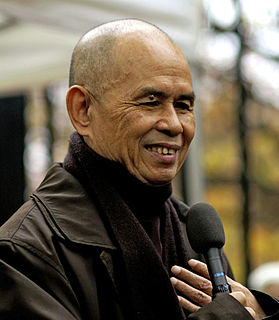
Thích Nhất Hạnh is a Vietnamese Buddhist monk and peace activist, founder of the Plum Village Tradition.

Lombard is a village in DuPage County, Illinois, United States, and a suburb of Chicago. The population was 42,322 at the 2000 census. The United States Census Bureau estimated the population in 2004 to be 42,975. The village's challenge to the Census Bureau regarding its official 2010 population was accepted, revising the official population of the village from 43,165 to 43,395.

Caledonia is a village in Livingston County, New York, USA. The population was 2,201 at the 2010 census. The name refers to Scotland.

Caledonia is a town in Livingston County, New York, United States. The population was 4,255 at the 2010 census.

Caledonia is a community located on the Grand River in Haldimand County, Ontario, Canada. It had a 2016 population of 9,674. Caledonia is within Ward 3 of Haldimand County. The Councillor elected for Ward 3 is Craig Grice. As of September 2006, there are approximately 4,000 households in the community of Caledonia.

Arthur Christopher Orme Plummer is a Canadian actor whose career has spanned six decades, beginning with his film debut in Stage Struck (1958).

Prunus mume is an Asian tree species classified in the Armeniaca section of the genus Prunus subgenus Prunus. Its common names include Chinese plum and Japanese apricot. The flower is usually called plum blossom. This distinct tree species is related to both the plum and apricot trees. Although generally referred to as a plum in English, it is more closely related to the apricot. In Chinese, Japanese and Korean cooking, the fruit of the tree is used in juices, as a flavouring for alcohol, as a pickle and in sauces. It is also used in traditional medicine.

Pershore is a market town in Worcestershire, England, on the banks of the River Avon. Pershore is in the Wychavon district and is part of the West Worcestershire parliamentary constituency. At the 2011 census the population was 7,125. The town is best known for Pershore Abbey, Pershore College, and the plums and pears grown locally.
Pierre Frogier is a French politician, who was President of the Government of New Caledonia from 2001 to 2004. He is French senator for New Caledonia since 2011, and was member of the National Assembly of France from 1996 to 2011. He served as President of the Congress of New Caledonia from 1995 to 1997.

The New Caledonian barrier reef is located in New Caledonia in the South Pacific, and is the longest continuous barrier reef in the world and the second largest after the Great Barrier Reef of Australia.

Maré Island or Nengone is the second-largest of the Loyalty Islands, in the archipelago of New Caledonia, an overseas territory of France in the Pacific Ocean. The island is part of the commune (municipality) of Maré, in the Loyalty Islands Province of New Caledonia.
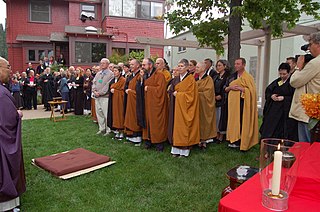
White Plum Asanga, sometimes termed White Plum Sangha, is a Zen school in the Hakuyu Taizan Maezumi lineage, created by Hakuyu Taizan Maezumi. It consists of Maezumi's Dharma heirs and subsequent successors and students. A diverse organization spread across the United States and with a small presence in Europe, the White Plum Asanga
[I]ncludes teachers who represent the spectrum of styles to be found to American Zen—socially engaged Buddhism, family practice, Zen and the arts, secularized Zen, and progressive traditionalism."

The 1995–96 South Pacific cyclone season was one of the least active South Pacific tropical cyclone season's on record, with only four tropical cyclones occurring within the South Pacific Ocean to the east of 160°E. The season officially ran from November 1, 1995, until April 30, 1996. The first storm developed on January 12, while the last one dissipated on April 2. During the season the most intense tropical cyclone was Severe Tropical Cyclone Beti, which reached a minimum pressure of 935 hPa (27.61 inHg) as it affected New Caledonia. After the season ended Beti's name was the only name to be retired from the tropical cyclone naming lists and was replaced with Bune, after it inflicted over 5.6 million (USD) worth of damage to Australia, Vanuatu, New Caledonia and New Zealand.
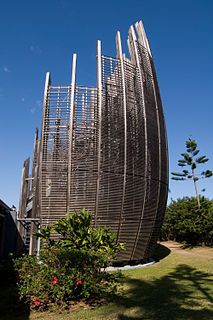
The Jean-Marie Tjibaou Cultural Centre, on the narrow Tinu Peninsula, approximately 8 kilometres (5.0 mi) northeast of the historic centre of Nouméa, the capital of New Caledonia, celebrates the vernacular Kanak culture, the indigenous culture of New Caledonia, amidst much political controversy over the independent status sought by some Kanaks from French rule. It opened in June 1998 and was designed by Italian architect Renzo Piano and named after Jean-Marie Tjibaou, the leader of the independence movement who was assassinated in 1989 and had had a vision of establishing a cultural centre which blended the linguistic and artistic heritage of the Kanak people.
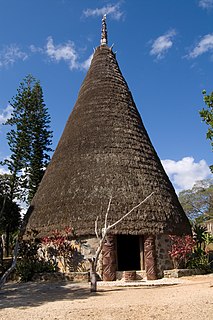
A flèche faîtière is a carved rooftop spear or spire or finial that adorns Kanak houses, particularly the Great Houses of the Kanak Chiefs, in New Caledonia. The ceremonial carving is the home of ancestral spirits and is characterized by three major components. The ancestor is symbolized by a flat, crowned face in the centre of the spear. The ancestor's voice is symbolized by a long, rounded pole that is run through by conch shells. The symbolic connection of the clan, through the chief, is a base, which is planted into the case's central pole. Sharply pointed wood pieces fan out from either end of the central area, symbolically preventing bad spirits from being able to reach the ancestor. It evokes, beyond a particular ancestor, the community of ancestors. The flèche faîtière was depicted on a 2007 New Caledonian stamp.
The New Caledonia national rugby sevens team finished in sixth place at the 2011 Pacific Games.
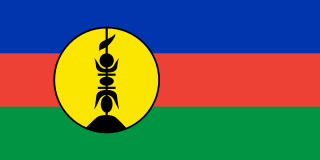
Kanak are the indigenous Melanesian inhabitants of New Caledonia, an overseas collectivity of France in the southwest Pacific. According to the 2014 census, they make up 39.1% of the total population with around 104,000 people.

















